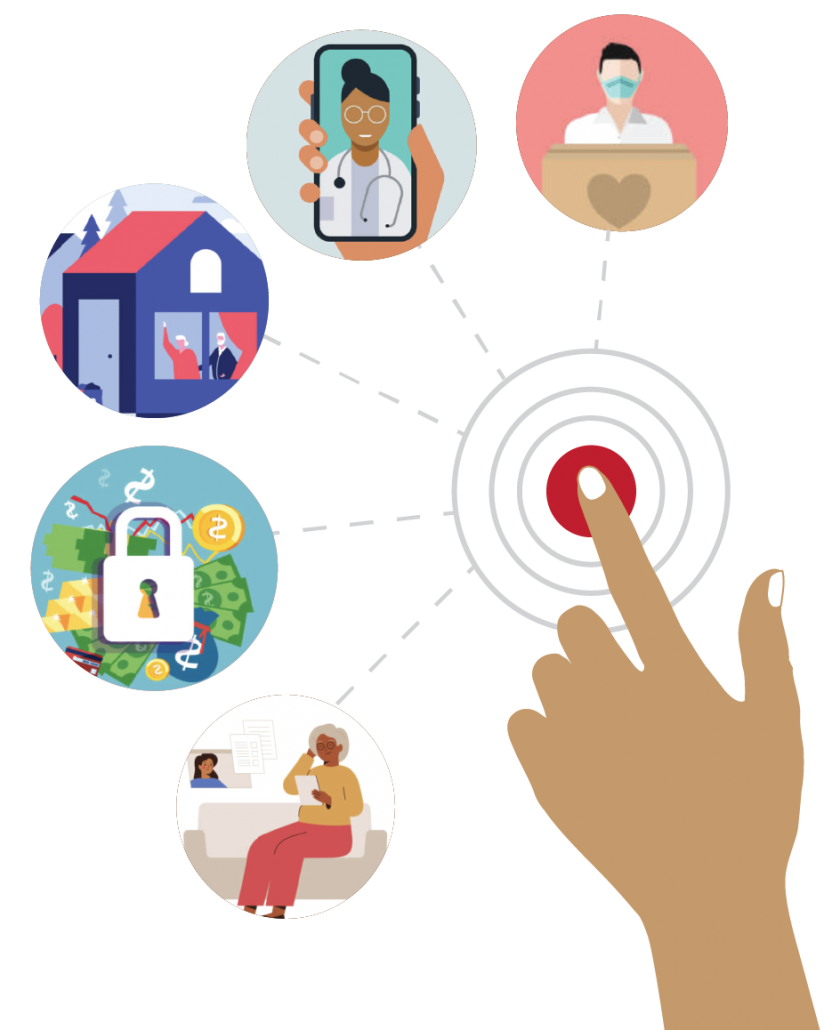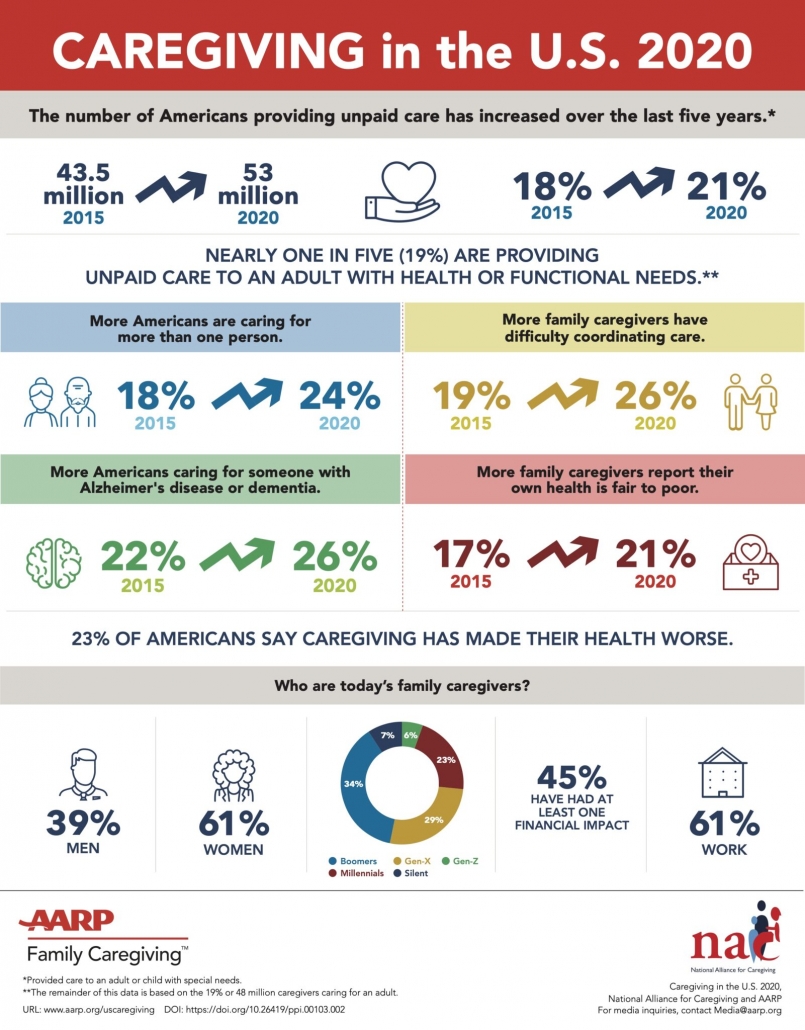
By Susan Golden, ScD
Fellow, Stanford Center on Longevity and Director, dciX, at the Stanford Distinguished Careers Institute
A few months before I was to be married, my mother had emergency quadruple bypass surgery following a heart attack. She was living in San Diego, and I was working in a venture capital firm in NYC. As a widow, my mother lived alone. After she was discharged from the hospital, I took an unpaid leave from the best job I’d ever had, postponed my wedding, and became one of the tens of millions of unpaid caregivers in the United States.
At the time, I didn’t think of myself as a caregiver – I was just being a daughter helping my mother. I didn’t know it then, but I would be in that role at different stages for the next 18 years, juggling career, parent care, and raising children. Often, I found it impossible to do all three at the same time, despite being fortunate in so many ways.
Although I earned a doctorate in public health, I could not navigate the health care and elder care system successfully for my mother. She was hospitalized five times in the last year of her life; three times in the last two months of her life. No company, organization, service, or product that could have aided her ever marketed to me.
It turns out, millions of unpaid caregivers and their families have been having the same experience. As our population rapidly ages, the number of available family caregivers in younger generations is also diminishing, making this a national crisis.
The Covid-19 pandemic has heightened this problem and prompted a national conversation about caregiving, and the lack of a care ecosystem for older adults that those in many other countries have. The immense challenges faced by caregivers in non-pandemic times multiplied a thousandfold as a result of pandemic-related restrictions on visits, the increased responsibilities of parents whose children were required to do distance learning at home, the acute caregiver shortage and lack of adequate support for caregivers in the U.S.
It has also pushed the private sector markets to do more. New companies that have emerged in the past several years are responding to the need to improve caregiving, as more people are isolated and will need to isolate at different times to combat the pandemic.
The immense challenges faced by caregivers in non-pandemic times multiplied a thousandfold as a result of pandemic-related restrictions on visits, the increased responsibilities of parents whose children were required to do distance learning at home, the acute caregiver shortage and lack of adequate support for caregivers in the U.S.
What are the challenges?
The number of people in need of care in the U.S. was expected to reach 117 million in 2020 with over 53 million unpaid caregivers, according to research by AARP and the National Alliance for Caregiving. The group forecast that consumers will spend an average of $509 per care recipient per year on caregiving solutions, and that the value of the unpaid caregiving market in the US exceeds $470 billion. In its 2020 Caregiving in the U.S. report, they found that the prevalence of caregiving has risen from 16.6 percent in 2015 to 19.2 percent in 2020 — an increase of over 8 million adults providing care to a family member or friend age 18 or older, i.e., over 48 million unpaid caregivers. This increase was primarily driven by a significant rise in the prevalence of caring for a relative or friend who is age 50 or older — now, more than 1 in 5.
Americans who provide unpaid care to an adult are an extension of, and partner with, our formal health care and long-term services and supports (LTSS) systems. The pandemic caused an increase in unpaid family caregiving, as many families chose to relocate their loved ones from assisted living and group living communities. We do not yet know the full extent to which each family has been impacted, and the numbers are likely to have increased since the report was issued in May 2020.
The importance of accelerating innovations to support caregivers was also recognized by Aging 2.0, a for profit global initiative to drive collaboration around the biggest challenges and opportunities in aging. In 2018, it launched Eight Grand Challenges as innovation priorities to support healthy and successful aging. Significantly, two of those eight challenges are devoted to Caregiving and to Care Coordination.
The Stanford Center on Longevity has also devoted several of its annual Design Challenge themes to identifying solutions for caregivers. In 2017 their theme of “Aging in Place” winners included TAME, Rendever, and Uppo. Rendever enables older adults to travel using virtual reality, and visit cities, countries and even their childhood home, often as part of a group. In 2014, the SCL challenge was to “Maximize Independence for those with Cognitive Impairment.”
Innovators to the rescue!
Thankfully, in the past several years, a new set of entrepreneurs have emerged to create solutions to assist caregivers and their recipients as part of the new longevity economy. In part, because of the dramatic increase in lifespan experienced prior to the pandemic, and the over 11,000 baby boomers turning 65 each day, many new companies have been launched to assist caregivers to address the varied and many needs and pain points a caregiver and their care recipient encounter. Several of these were able to successfully pivot their services and products when the pandemic hit to accommodate the needs of caregivers and their recipients.
These innovators now integrate digital solutions, with tech products and services driving growth. While in 2016 just 28 percent of market revenues related to caregiving involved products and services that relied on tech, it is expected that in 2021 over 53 percent of revenues will derive from digital solutions. There are now hundreds of companies who are entering this market to address the range of caregiving needs including:
 Transition planning and care
Transition planning and care- Enhanced home care providers and care coordination
- Advance Care planning and End of Life Planning
- Addressing Loneliness and Isolation
- New alternative housing solutions
- Care navigators and health care advocates
- Telehealth options to include specialty care
- Coordination and integration of medical records and data
- Financial tools and services to assist in planning and prevent elder fraud
- Products and services to maintain health of caregivers
- Platforms to assist in finding local resources to assist caregivers
- Digital Literacy services
Honor is a home-care technology company that partners with local agencies and provides home “care pros” using an integrated digital platform to coordinate care. It uses artificial intelligence to optimize the schedules of the care pros with the needs of the care recipient, particularly for those who do not want or need full time care. Honor also provides back end services to local home-care provider companies, expanding their reach into local markets nationwide.
Cake has created a digital platform to assist in planning for all end of life care needs, including legal, financial, advance care planning and partners with hundreds of companies to provide comprehensive services. Their platform is available direct to consumers, in addition to partnering with employers and financial institutions.
Wider Circle is addressing the isolation older adults often experience when they choose to age in their homes, by developing a range of programming for older adults to participate in. It also matches them with “circles” of neighbors to engage with. The company was able to pivot during the pandemic and offer virtual programming to its members.
We have seen more companies focused on addressing the issues of loneliness and isolation, which has now been well documented to have significant health impacts equivalent to smoking 15 cigarettes a day. Mon Ami, initially launched in 2019 to provide respite activity companions for family members with dementia or who are homebound by matching them with students, was able to convert its services to virtual visits once the pandemic began. Among its new clients was the City of San Francisco, which partnered with Mon Ami and successfully provided services to homebound seniors during the pandemic, including grocery shopping, tech support, and companionship.
Papa is a platform that connects college and nursing students to older adults for companionship and assistance with transportation, shopping and support. In the midst of the pandemic, their services were in even greater demand, and Papa successfully raised its Series B round to now provide Papa Health, a network of board-certified physicians, nurse practitioners and behavioral health specialists, largely through telehealth.
Memory Well is a digital platform to enable more personalized care for those whose family may not be nearby, or, in the case of the pandemic, unable to visit them. The company uses professional journalists who capture the life stories of patients, have a digital file uploaded to their medical care records, and are available to any provider or caregiver. This enhances personal care and health outcomes. It’s asimple solution that creates a caring environment for those whose loved ones may not be able to be nearby to advocate for them.
An integral component needed for these tech-based solutions to succeed is digital literacy in both the care provider and the care recipient. Companies such as Candoo Tech are providing digital literacy services and tools to enable older adults to adapt quickly to the new need for a virtual world. Digital literacy is increasingly being considered one of the Social Determinants of Health.
Telehealth has become a key growth area resulting from the pandemic, and by all accounts may become the first line of health care provided, particularly for older adults and their caregivers, to eliminate the increased exposure to the Covid-19 stemming from travel to the appointment, waiting rooms, and in-person visits. The pandemic accelerated the use of telehealth visits, with over 90% now being used by healthcare systems. The recognition of its value was enhanced when the CMS approved Medicare reimbursement for telehealth visits, and companies are emerging to cater to the older population’s use of telehealth, such as Tembo Health, and Rezilient Health.
A new trend in caregiving is care navigators. Often known as geriatric care managers or health advocates, these individuals do indeed know how to navigate the complex health care and elder care system, that I personally felt unable to do so for my own mother. Had I been marketed to, I would surely have relied on a professional who has done this hundreds of times, as opposed to my own learning curve which changed with each discharge diagnosis. New companies and platforms are emerging to help with the coordination of care, such as Wellthy and Vesta Health.
Another new concept to enhance aging in place and provide support when needed for active aging adults is co-housing arrangements. A new company, Upside HoM, has been created that provides fully furnished apartments with a range of concierge services from food shopping to caregiving to support successful aging, as well as finding a roommate if the person desires, and access to activities and programs. This type of business not only addresses the range of caregiving and support an older adult will need, but also has the ability to address the loneliness and isolation so common to those who live alone.
Had these companies existed during my years as a caregiver, I would have been more easily able to enjoy a career, parenting and being a daughter at the same time. The type of housing and support services offered by Upside HoM, would have been ideal for my mother when she lived in San Diego and I lived far away. Having care coordination services and navigators would have most likely prevented the spiral of readmissions that she experienced in the last years of her life. Having peace of mind comes from using trusted resources in an area that you may not be familiar with, and will appeal to many families throughout the United States.
So significant is the need for caregiving innovations, that a new Techstars Future of Longevity Accelerator was launched in 2020 in partnership with Pivotal Ventures, the Melinda Gates personal incubation and investment company, to support the development of innovations for caregivers of older adults and their care recipients. This three-year initiative, will see 30 companies participate in the accelerator, addressing the multitude of needs and pain points unpaid caregivers face.
The importance of finding solutions for the caregiving crisis in the US, that has grown due to the pandemic, has also generated new ways to celebrate those involved in accelerating innovations. The Holding Co. was formed in 2020 in partnership with Pivotal Ventures. To bring attention to the importance of creating caregiving solutions, they have created a Care 100 list spotlighting the array of innovators, entrepreneurs, visionaries, and policy makers all working to create a better system of care for families. They work with a portfolio of innovative companies – from venture-backed startups to nonprofits to corporations – to build the solutions today’s families need to thrive. Venture funding has increased from $39 million in 2011 for innovations to support the care of older adults, to nearly $500 million in 2018.
There are a multitude of stakeholders in creating a successful care ecosystem for older adults. Having national, state and local government, private sector innovators, insurance companies, families, employers, providers, and Medicare and Medicare Advantage plans, all working to support dignity and respect for older adults, can create a successful aging and caregiving ecosystem in the United States.
CONTINUE READING
Chart: Caregiving in the US 2020 (click to enlarge)
 From Caregiving in the US 2020, AARP and National Alliance for Caregiving
From Caregiving in the US 2020, AARP and National Alliance for Caregiving

